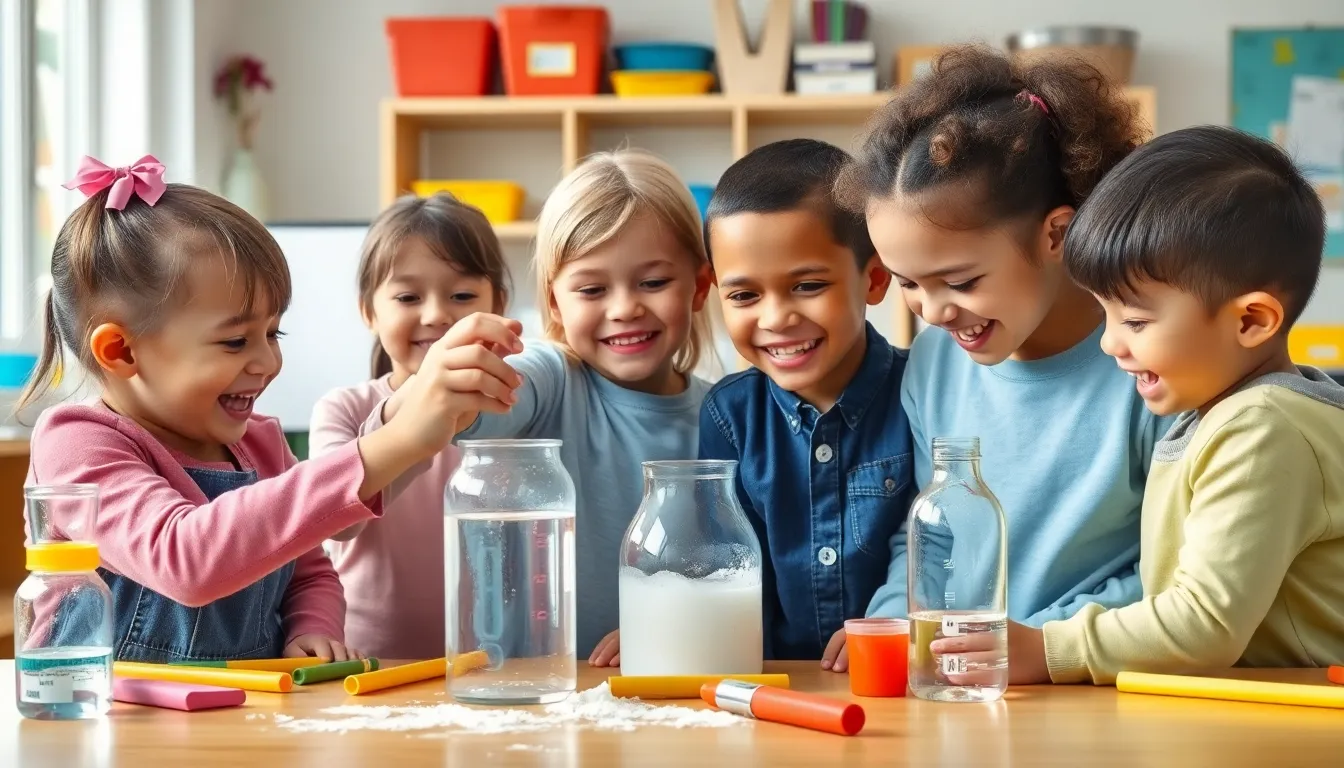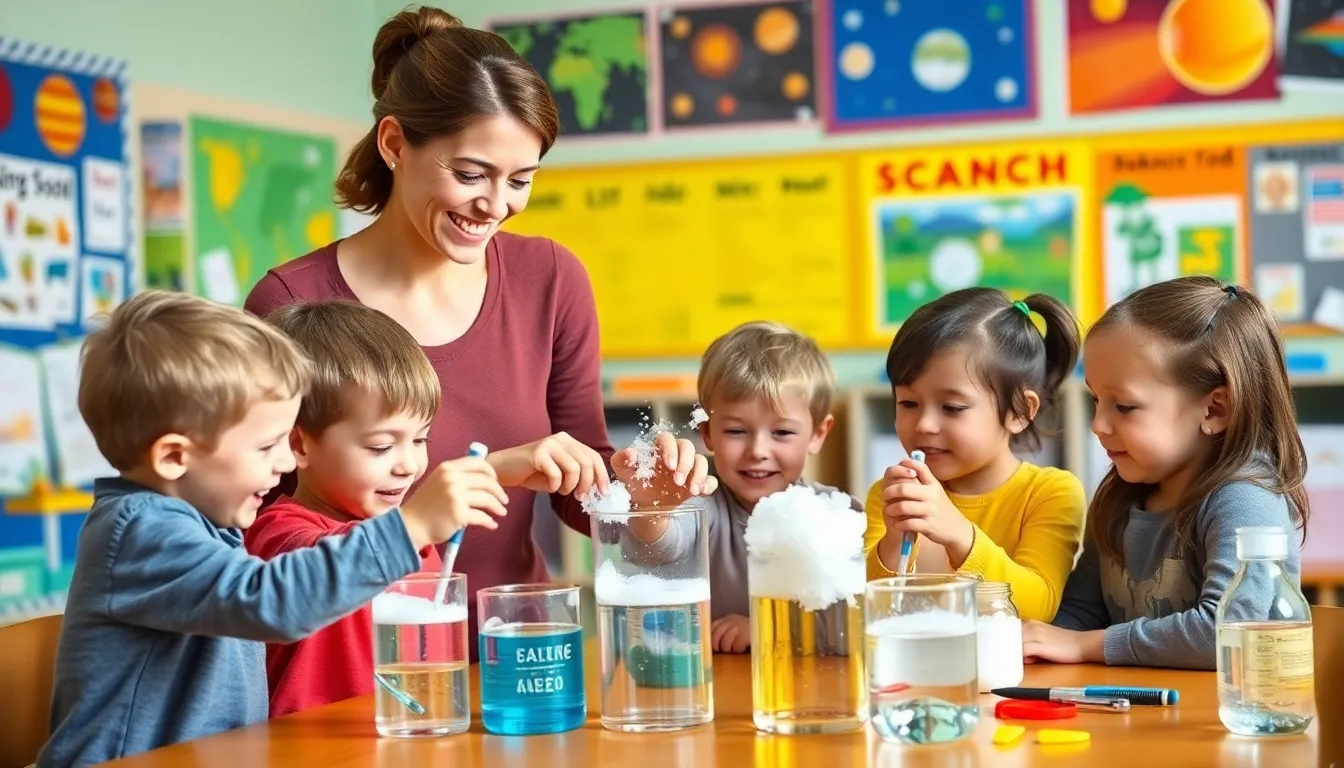In a world where kids are more curious than cats and just as prone to getting into mischief, preschool science activities offer the perfect blend of fun and learning. Imagine tiny hands experimenting with bubbling potions or building towers that defy gravity—it’s like a mini version of a mad scientist’s lab! These activities not only spark a child’s imagination but also lay the groundwork for critical thinking skills they’ll need in the future.
Table of Contents
ToggleOverview of Preschool Science Activities
Preschool science activities spark curiosity and foster a love for exploration in young children. Engaging in hands-on experiments makes learning enjoyable while enhancing foundational skills. Kids often experience joy when they witness simple chemical reactions, like mixing baking soda and vinegar to create fizzing bubbles.
Through building projects, children develop problem-solving abilities. Constructing towers with blocks allows for experimentation with balance and gravity. Children learn valuable concepts as they test different designs to see which stands tall.
Nature-based activities also play a crucial role. Observing plants and animals nurtures an appreciation for the environment. Collecting leaves helps kids identify various species, while outdoor scavenger hunts promote observation and critical thinking.
Sensory activities contribute significantly to preschoolers’ learning experiences. Engaging in water play, for instance, allows children to investigate concepts such as buoyancy and displacement. Using different materials in sensory bins enriches their understanding of textures and properties.
Curriculum integration elevates preschool science learning. Combining art projects with scientific concepts encourages creativity. For example, crafting a model of the solar system visually represents planetary positions, reinforcing understanding through artistic expression.
Overall, preschool science activities play a vital role in early childhood development. They cultivate skills in observation, experimentation, and analysis while ensuring children have fun. Each activity serves as a building block toward lifelong learning and scientific literacy.
Importance of Science Activities in Preschool

Science activities play a crucial role in preschool education. They provide children with engaging experiences that stimulate curiosity and lay the groundwork for critical skills.
Cognitive Development
Hands-on science activities enhance cognitive development in preschoolers. Engaging in experiments promotes problem-solving abilities, critical thinking, and reasoning. Activities like mixing baking soda and vinegar illustrate chemical reactions, captivating young minds. Children learn to hypothesize, observe outcomes, and draw conclusions. Building structures with blocks sharpens spatial awareness and fine motor skills. Exploring nature and ecosystems fosters attention to detail and encourages questioning. Overall, these experiences create a solid foundation for future learning in science and other disciplines.
Social Skills Enhancement
Social skills improve significantly through collaborative science activities. Working together on projects encourages teamwork and communication. Children learn to share ideas, resolve conflicts, and practice patience while engaging in experiments. Group activities foster a sense of community and belonging. For example, constructing a science project as a team allows each child to contribute their unique perspective. Sharing discoveries enhances verbal skills, while peer interactions boost emotional intelligence. Through these shared experiences, preschoolers develop essential skills that benefit their social development.
Types of Preschool Science Activities
Preschool science activities encompass various engaging approaches. Each type stimulates curiosity and promotes learning through play.
Hands-On Experiments
Kids thrive on hands-on experiments, which foster exploration and excitement. Adding simple materials creates memorable experiences. For instance, mixing baking soda and vinegar leads to captivating chemical reactions, allowing children to observe the fizz and bubbles firsthand. Pouring liquids, measuring ingredients, and manipulating objects enhances fine motor skills while reinforcing scientific concepts. Engaging with the senses makes learning interactive and enjoyable.
Nature Exploration
Nature exploration provides invaluable opportunities for outdoor learning. Children observe plants, insects, and animals, deepening their understanding of ecosystems. Collecting leaves or examining insects sparks curiosity about biodiversity and environmental stewardship. Nature walks encourage kids to ask questions and make discoveries as they interact with their surroundings. Maintaining a nature journal can document findings and enhance observation skills, leading to richer educational insights.
Simple Engineering Projects
Simple engineering projects break down complex concepts into child-friendly activities. Constructing towers with blocks or bridges with recycled materials introduces fundamental engineering principles. Kids experiment with balance, stability, and design, all while using their creativity. Challenges like building the tallest tower or the strongest bridge prompt collaboration and critical thinking. These hands-on projects contribute to a strong foundation in problem-solving and innovation.
Tips for Implementing Science Activities
Implementing science activities in preschool can enhance learning and curiosity. Educators can easily follow some helpful tips to maximize engagement and safety.
Choosing Age-Appropriate Activities
Selecting activities that match children’s developmental stages is vital. Engaging tasks, like simple experiments, captivate preschoolers’ attention. For instance, mixing colors using safe, washable paints introduces foundational concepts. Additionally, nature exploration, such as collecting leaves, fosters curiosity about the environment. Activities must challenge but not overwhelm kids, ensuring fun remains central to the experience. Each endeavor should encourage incremental skill development, aligning with children’s evolving understanding of scientific principles.
Creating a Safe Learning Environment
Safety remains paramount in any learning setting. It’s essential to assess the area for potential hazards, ensuring materials access is secure. Providing clearly marked tools communicates safety protocols to children. Engaging supervision during experiments helps preempt any risks, especially with hands-on activities. Safety goggles, gloves, and aprons can protect preschoolers while they explore. Establishing clear boundaries reinforces expectations and minimizes accidents, creating a comfortable space for discovery. Each aspect contributes to a nurturing environment that fosters both curiosity and safety.
Preschool science activities are essential for fostering a love of learning in young children. They not only engage kids in fun and interactive ways but also build foundational skills that are crucial for their development. By exploring hands-on experiments nature and engineering projects children cultivate curiosity and critical thinking.
These activities create opportunities for social interaction and teamwork enhancing communication and emotional intelligence. With the right approach educators can create a safe and stimulating environment that encourages exploration and discovery. Embracing preschool science activities lays the groundwork for lifelong learning and scientific literacy ensuring children are well-prepared for future academic challenges.




